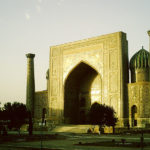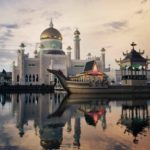Introduction
“You will not find any gay bars or clubs in Ashgabat (‘City of Love’), the capital city of Turkmenistan, despite a population of about one million people; homosexuality is illegal in Turkmenistan.” That is the welcoming message to gays from this rural and desolate country on the Caspian Sea in western Asia. The LGBT ‘scene’ is hardly that. Not surprising, Turkmen gays and lesbians tend to be in the closet although there is a small gay community in the capital. “Gay Life in Turkmenistan” is very secretive and they keep to themselves, for good reason since the culture is Muslim and the country was brutalized by the Soviets and nearly destroyed by the thankfully deceased anti-gay dictator Saparmurat Niyazov from 1991 to 2006.
Country Description
Turkmenistan declared independence on 27 October 1991, one of the last Soviet republics to secede. Turkmenistan gained official recognition on 25 December 1991, a day before the final dissolution of the Soviet Union. It possesses the world’s fourth largest reserves of natural gas resources. Although it is wealthy in natural resources in certain areas, most of the country is covered by the Karakum (Black Sand) Desert. Much of Turkmenistan is desolate and rural; small villages offer much to see during the daylight hours.
In September 2008, the People’s Council unanimously passed a resolution adopting a new Constitution. The latter resulted in the abolition of the Council and a significant increase in the size of Parliament in December 2008. The new Constitution also permits the formation of multiple political parties. The former Communist Party, now known as the Democratic Party of Turkmenistan, has been the only one effectively permitted to operate. Political gatherings are illegal unless government sanctioned.
According to 2005 estimates, there are approximately 4.9 million people in Turkmenistan, the least populated of the Central Asian republics. The largest ethnic group is the Turkmen, constituting 77 percent of the total population. The three main minority groups are Russians, Uzbeks, and Kazakhs. There are also smaller numbers of Tatars, Ukrainians, Azeris, Armenians, and Baluchis (from areas of Iran and Pakistan).
Turkmenistan has been widely criticized for human rights abuses and has imposed severe restrictions on foreign travel for its citizens. Discrimination against the country’s ethnic minorities remain in practice. Universities have been encouraged to reject applicants with non-Turkmen surnames, especially ethnic Russians. It is forbidden to teach the customs and language of the Baloch, an ethnic minority. The same for Uzbeks, though the Uzbek language used to be taught in some national schools.
According to Reporters Without Borders’ 2011 World Press Freedom Index, Turkmenistan had the 3rd worst press freedom conditions in the world, behind North Korea and Burma. It is considered to be one of the “10 Most Censored Countries”.
The Situation for LGBT Citizens
From: Labrys comes this 2008 report:
Homosexuality is criminalized and considered a mental disorder in Turkmenistan. Men who have sex with men receive a prison sentence of 2 years for homosexual conduct. People are also sent to receive “cures” for homosexuality in psychiatric institutions. These punishments are also applicable to the situations of perceived homosexual behaviour.
The anti-homosexuality law does not specifically mention women who have sex with women In May 2007, Columbia Law School in United States of America secured asylum for a lesbian from Turkmenistan as she feared to face persecution because of her sexual orientation and political views.
Mainstream societal attitudes are openly homophobic, including medical educational resources and health providers’ performance. Lesbian, gay men, bisexual and transgender people are culturally invisible, very stigmatized, and rarely unite into the groups.
HIV Efforts in Turkmenistan
From the British Red Cross is this report:
We have been supporting the Turkmenistan Red Crescent’s HIV work since 2002; the HIV program reached over 25,397 people; over 255 volunteers were trained; around 5,000 booklets, brochures and other education materials were given out.
Red Crescent volunteers are key to what we do in Turkmenistan, providing important advice about transmission and prevention in a country where information about sexual health issues is scarce. Volunteers speak to groups that are most at risk of HIV, such as injecting drug users, sex workers, the military, and men who have sex with men.
Homosexuality is illegal in Turkmenistan, and getting basic information about HIV is difficult for men who have sex with men, despite being one of the most at risk populations.
Also see:
From American Thinker
December 27, 2006
The End of Turkmenistan’s Autocrat, Saparmurat Niyazov
In the end, Niyazov took a country of enormous potential wealth–Turkmenistan sits atop one of the world’s largest gas reserves–and managed to leave the Turkmen people in poverty, with the highest infant mortality rate and lowest life expectancy in the region.
















